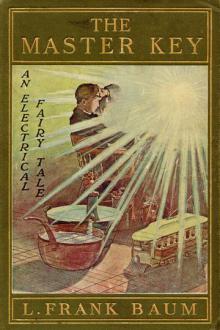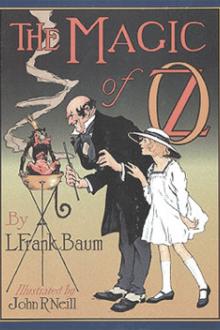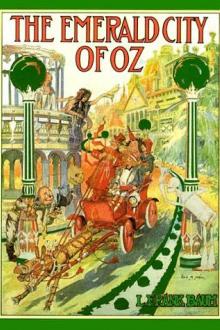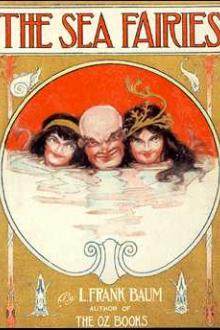The Master Key by Lyman Frank Baum (free children's ebooks online .txt) 📕

- Author: Lyman Frank Baum
- Performer: -
Book online «The Master Key by Lyman Frank Baum (free children's ebooks online .txt) 📕». Author Lyman Frank Baum
There was no one to see him, thank goodness! and the tears gave him considerable relief. He dried his eyes, made an honest struggle to regain his cheerfulness, and then muttered to himself:
“If I stay up here, like an air-bubble in the sky, I shall certainly go crazy. I suppose there’s nothing but water to look at down below, but if I could only sight a ship, or even see a fish jump, it would do me no end of good.”
Thereupon he descended until, as the ocean’s surface same nearer and nearer, he discovered a tiny island lying almost directly underneath him. It was hardly big enough to make a dot on the biggest map, but a clump of trees grew in the central portion, while around the edges were jagged rocks protecting a sandy beach and a stretch of flower-strewn upland leading to the trees.
It looked beautiful from Rob’s elevated position, and his spirits brightened at once.
“I’ll drop down and pick a bouquet,” he exclaimed, and a few moments later his feet touched the firm earth of the island.
But before he could gather a dozen of the brilliant flowers a glad shout reached his ears, and, looking up, he saw two men running towards him from the trees.
They were dressed in sailor fashion, but their clothing was reduced to rags and scarcely clung to their brown, skinny bodies. As they advanced they waved their arms wildly in the air and cried in joyful tones:
“A boat! a boat!”
Rob stared at them wonderingly, and had much ado to prevent the poor fellows from hugging him outright, so great was their joy at his appearance. One of them rolled upon the ground, laughing and crying by turns, while the other danced and cut capers until he became so exhausted that he sank down breathless beside his comrade.
“How came you here?” then inquired the boy, in pitying tones.
“We’re shipwrecked American sailors from the bark ‘Cynthia Jane,’ which went down near here over a month ago,” answered the smallest and thinnest of the two. “We escaped by clinging to a bit of wreckage and floated to this island, where we have nearly starved to death. Indeed, we now have eaten everything on the island that was eatable, and had your boat arrived a few days later you’d have found us lying dead upon the beach!”
Rob listened to this sad tale with real sympathy.
“But I didn’t come here in a boat,” said he.
The men sprang to their feet with white, scared faces.
“No boat!” they cried; “are you, too, shipwrecked?”
“No;” he answered. “I flew here through the air.” And then he explained to them the wonderful electric traveling machine.
But the sailors had no interest whatever in the relation. Their disappointment was something awful to witness, and one of them laid his head upon his comrade’s shoulder and wept with unrestrained grief, so weak and discouraged had they become through suffering.
Suddenly Rob remembered that he could assist them, and took the box of concentrated food tablets from his pocket.
“Eat these,” he said, offering one of each to the sailors.
At first they could not understand that these small tablets would be able to allay the pangs of hunger; but when Rob explained their virtues the men ate them greedily. Within a few moments they were so greatly restored to strength and courage that their eyes brightened, their sunken cheeks flushed, and they were able to converse with their benefactor with calmness and intelligence.
Then the boy sat beside them upon the grass and told them the story of his acquaintance with the Demon and of all his adventures since he had come into possession of the wonderful electric contrivances. In his present mood he felt it would be a relief to confide in some one, and so these poor, lonely men were the first to hear his story.
When he related the manner in which he had clung to the Turk while both ascended into the air, the elder of the two sailors listened with rapt attention, and then, after some thought, asked:
“Why couldn’t you carry one or both of us to America?”
Rob took time seriously to consider this idea, while the sailors eyed him with eager interest. Finally he said:
“I’m afraid I couldn’t support your weight long enough to reach any other land. It’s a long journey, and you’d pull my arms out of joint before we’d been up an hour.”
Their faces fell at this, but one of them said:
“Why couldn’t we swing ourselves over your shoulders with a rope? Our two bodies would balance each other and we are so thin and emaciated that we do not weigh very much.”
While considering this suggestion Rob remembered how at one time five pirates had clung to his left leg and been carried some distance through the air.
“Have you a rope?” he asked.
“No,” was the answer; “but there are plenty of long, tough vines growing on the island that are just as strong and pliable as ropes.”
“Then, if you are willing to run the chances,” decided the boy, “I will make the attempt to save you. But I must warn you that in case I find I can not support the weight of your bodies I shall drop one or both of you into the sea.”
They looked grave at this prospect, but the biggest one said:
“We would soon meet death from starvation if you left us here on the island; so, as there is at least a chance of our being able to escape in your company I, for one, am willing to risk being drowned. It is easier and quicker than being starved. And, as I’m the heavier, I suppose you’ll drop me first.”
“Certainly,” declared Rob, promptly.
This announcement seemed to be an encouragement to the little sailor, but he said, nervously:
“I hope you’ll keep near the water, for I haven’t a good head for heights—they always make me dizzy.”
“Oh, if you don’t want to go,” began Rob, “I can easily—”
“But I do! I do! I do!” cried the little man, interrupting him. “I shall die if you leave me behind!”
“Well, then, get your ropes, and we’ll do the best we can,” said the boy.
They ran to the trees, around the trunks of which were clinging many tendrils of greenish-brown vine which possessed remarkable strength. With their knives they cut a long section of this vine, the ends of which were then tied into loops large enough to permit the sailors to sit in them comfortably. The connecting piece Rob padded with seaweed gathered from the shore, to prevent its cutting into his shoulders.
“Now, then,” he said, when all was ready, “take your places.”
The sailors squatted in the loops, and Rob swung the vine over his shoulders and turned the indicator of the traveling machine to “up.”
As they slowly mounted into the sky the little sailor gave a squeal of terror and clung to the boy’s arm; but the other, although seemingly anxious, sat quietly in his place and made no trouble.
“D—d—don’t g—g—go so high!” stammered the little one, tremblingly; “suppose we should f—f—fall!”
“Well, s’pose we should?” answered Rob, gruffly. “You couldn’t drown until you struck the water, so the higher we are the longer you’ll live in case of accident.”
This phase of the question seemed to comfort the frightened fellow somewhat; but, as he said, he had not a good head for heights, and so continued to tremble in spite of his resolve to be brave.
The weight on Rob’s shoulders was not so great as he had feared, the traveling machine seeming to give a certain lightness and buoyancy to everything that came into contact with its wearer.
As soon as he had reached a sufficient elevation to admit of good speed he turned the indicator once more to the east and began moving rapidly through the air, the shipwrecked sailors dangling at either side.
“This is aw—aw—awful!” gasped the little one.
“Say, you shut up!” commanded the boy, angrily. “If your friend was as big a coward as you are I’d drop you both this minute. Let go my arm and keep quiet, if you want to reach land alive.”
The fellow whimpered a little, but managed to remain silent for several minutes. Then he gave a sudden twitch and grabbed Rob’s arm again.
“S’pose—s’pose the vine should break!” he moaned, a horrified look upon his face.
“I’ve had about enough of this,” said Rob, savagely. “If you haven’t any sense you don’t deserve to live.” He turned the indicator on the dial of the machine and they began to descend rapidly.
The little fellow screamed with fear, but Rob paid no attention to him until the feet of the two suspended sailors were actually dipping into the waves, when he brought their progress to an abrupt halt.
“Wh—wh—what are you g—g—going to do?” gurgled the cowardly sailor.
“I’m going to feed you to the sharks—unless you promise to keep your mouth shut,” retorted the boy. “Now, then; decide at once! Which will it be—sharks or silence?”
“I won’t say a word—‘pon my honor, I won’t!” said the sailor shudderingly.
“All right; remember your promise and we’ll have no further trouble,” remarked Rob, who had hard work to keep from laughing at the man’s abject terror.
Once more he ascended and continued the journey, and for several hours they rode along swiftly and silently. Rob’s shoulders were beginning to ache with the continued tugging of the vine upon them, but the thought that he was saving the lives of two unfortunate fellow-creatures gave him strength and courage to persevere.
Night was falling when they first sighted land; a wild and seemingly uninhabited stretch of the American coast. Rob made no effort to select a landing place, for he was nearly worn out with a strain and anxiety of the journey. He dropped his burden upon the brow of a high bluff overlooking the sea and, casting the vine from his shoulders, fell to the earth exhausted and half fainting.
17. The Coast of OregonWhen he had somewhat recovered, Rob sat up and looked around him. The elder sailor was kneeling in earnest prayer, offering grateful thanks for his escape from suffering and death. The younger one lay upon the ground sobbing and still violently agitated by recollections of the frightful experiences he had undergone. Although he did not show his feelings as plainly as the men, the boy was none the less gratified at having been instrumental in saving the lives of two fellow-beings.
The darkness was by this time rapidly enveloping them, so Rob asked his companions to gather some brushwood and light a fire, which they quickly did. The evening was cool for the time of year, and the heat from the fire was cheering and grateful; so they all lay near the glowing embers and fell fast asleep.
The sound of voices aroused Rob next morning, and on opening his eyes and gazing around he saw several rudely dressed men approaching. The two shipwrecked sailors were still sound asleep.
Rob stood up and waited for the strangers to draw near. They seemed to be fishermen, and were much surprised at finding three people asleep upon the bluff.
“Whar ‘n thunder ‘d ye come from?” asked the foremost fisherman, in a surprised voice.
“From the sea,” replied the boy. “My friends here are shipwrecked sailors from the ‘Cynthia Jane.’”
“But how’d ye make out to climb the bluff?” inquired a second fisherman; “no one ever did it afore, as we knows on.”
“Oh, that is a long story,” replied the boy, evasively.
The two sailors had awakened and now saluted





Comments (0)